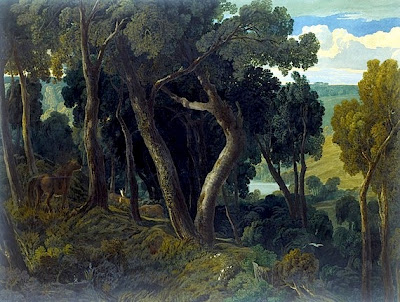Lines 21-40, Keats' Ode to a Nightingale
 |
| Wichwood Forest, J.M.W Turner |
What thou among the leaves hast never known,10
The weariness, the fever, and the fret10
Here, where men sit and hear each other groan;10
Where palsy shakes a few, sad, last grey hairs,10
Where youth grows pale, and spectre-thin, and dies;10
Where but to think is to be full of sorrow11
And leaden-eyed despairs;6
Where Beauty cannot keep her lustrous eyes,10
The tone is one of helplessness and transience or mortality. "Where men sit and hear each other groan" if instead of sitting they tried to do something to help one another there would be less pain but he mourns that for now they just sit. The poet is tempted to forget his cares with the 'wine' of inspiration but quickly realizes the little it would do, instead he will rise above with poetry:
 |
| Dovedale by Moonlight, Joseph Wright |
Away! away! for I will fly to thee,10
Not charioted by Bacchus and his pards,11
But on the viewless wings of Poesy,9
Though the dull brain perplexes and retards:10
Already with thee! tender is the night,10
And haply the Queen-Moon is on her throne,10
Clustered around by all her starry Fays;10
But here there is no light6
Save what from heaven is with the breezes blown11
Through verdurous glooms and winding mossy ways.11
One thing that strikes me is how it's like a stream of consciousness. I read that it's been critiqued for lack of coherency but our thoughts are not always coherent nor our feelings.


Comments